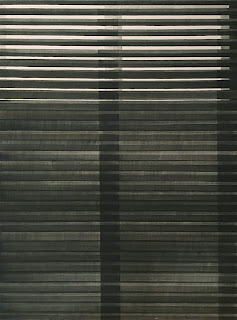I curated a show at the Ukrainian Institute of Modern Art titled Nothing Is Ours But Time. Go see it before it closes.
The show runs February 9th - March 25th, 2018
Featuring artists Melody Saraniti, Erin Washington, Matthew Metzger, Christine Han, Selina Trepp, Daniel Schmid, Jenn Dierdorf, Mel Cook, Karen Azarnia
How many times have you been unable to sleep at night thinking about all the things left to do? Going over what you were able to accomplish and what tasks were postponed and how much time was wasted on chores, commuting, and procrastination. How many of us have compared our success to that of our friends and felt panic, jealousy, and dread?
Almost 2000 years ago, Roman Stoic philosopher Seneca wrote letters to his friend Lucilius Junior warning him that "while we are postponing, life speeds by." There is some comfort in knowing that even brilliant philosophers of ancient Rome suffered the anxieties of daily life. However, in his letter, Seneca reminds his friend that "nothing is ours except time."
The act of painting is an attempt to capture a moment, to preserve a gesture or an image in a suspension of pigment and oil. The artists in this exhibition use painting as a way to mark time and to contain it. Their work is focused on capturing fleeting everyday moments. Selina Trepp uses and reuses only the materials currently present in her studio to make work. Ultimately, she will leave behind little more than digital images for her descendants to contend with. Mel Cook is a modern-day Vanitas painter, reminding the viewer of his or her own mortality. Through painting she responds to inequity and death with uncorked anger. Karen Azarnia's triptych of paintings documents a handprint on a window that disappeared over the course of an afternoon drive. Erin Washington maintains no illusions that her work will serve as a lasting legacy after she is gone. Her drawings and paintings, done in chalk and fugitive pigments, are designed to fade, smudge, and fall apart. Time still slips through our fingers, but every moment spent in an act of creation is one that we can count as ours.
-Gwendolyn Zabicki, 2018
From Seneca, Volume IV, Epistles 1-65, Harvard University Press:
Greetings from Seneca to Lucilius
Continue to act thus, my dear Lucilius—set yourself free for your own sake; gather and save your time, which until lately has been forced from you, or filched away, or has merely slipped from your hands. Make yourself believe the truth of my words—that certain moments are torn from us, that some are gently removed, and that others glide beyond our reach. The most disgraceful kind of loss, however, is that due to carelessness. Furthermore, if you will pay close heed to the problem, you will find that the largest portion of our life passes while we are doing ill, a goodly share while we are doing nothing, and the whole while we are doing that which is not to the purpose. What man can you show me who places any value on his time, who reckons the worth of each day, who understands that he is dying daily? For we are mistaken when we look forward to death; the major portion of death has already passed. Whatever years lie behind us are in death's hands.
Therefore, Lucilius, do as you write me that you are doing: hold every hour in your grasp. Lay hold of today's task, and you will not need to depend so much upon tomorrow's. While we are postponing, life speeds by. Nothing, Lucilius, is ours, except time. We were entrusted by nature with the ownership of this single thing, so fleeting and slippery that anyone who will can oust us from possession. What fools these mortals be! They allow the cheapest and most useless things, which can easily be replaced, to be charged in the reckoning, after they have acquired them; but they never regard themselves as in debt when they have received some of that precious commodity—time! And yet time is the one loan which even a grateful recipient cannot repay.
You may desire to know how I, who preach to you so freely, am practising. I confess frankly: my expense account balances, as you would expect from one who is free-handed but careful. I cannot boast that I waste nothing, but I can at least tell you what I am wasting, and the cause and manner of the loss; I can give you the reasons why I am a poor man. My situation, however, is the same as that of many who are reduced to slender means through no fault of their own: every one forgives them, but no one comes to their rescue.
What is the state of things, then? It is this: I do not regard a man as poor, if the little which remains is enough for him. I advise you, however, to keep what is really yours; and you cannot begin too early. For, as our ancestors believed, it is too late to despair when you reach the dregs of the cask. Of that which remains at the bottom, the amount is slight, and the quality is vile. Farewell.
Karen Azarnia
Karen Azarnia
Mel Cook
Jenn Dierdorf
Jenn Dierdorf
Christine Han
Christine Han
Matthew Metzger
Matthew Metzger
Matthew Metzger
Melody Saraniti
Daniel Schmid
Daniel Schmid
Daniel Schmid
Daniel Schmid
Selina Trepp
Selina Trepp
Erin Washington
Erin Washington


















